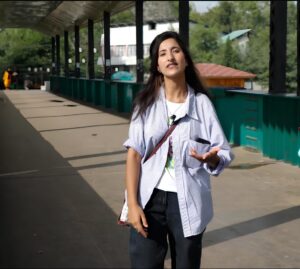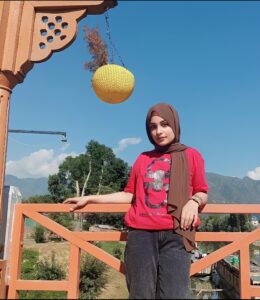Kashmir’s female Hip-Hop revolution
About eight years ago, in July 2016, widespread protests broke out in schools all around in Jammu and Kashmir, notably in Kashmir valley, following the death of a wanted militant Burhan Wani, leading to closure of schools and colleges for almost a year.
The frequent lockdowns “ignited a fire” in 16-year-old Mehak Ashraf, a resident of Hazratbal area in Srinagar. To express her struggle and that of individuals around her, Ashraf decided to try using rap. Taking up a stage name Menime, the reverse of famous rapper Eminem, she began rapping about gender inequality, political foul play and other social issues.
Almost eight years on, Ashraf stands as a trailblazing pioneer who introduced hip-hop to Jammu and Kashmir. As a trendsetter, she has not only left an permanent mark with her music carved a path for herself but also paved the way for other girls in Kashmir aspiring to embrace music and showcase their talent through rap. Ashraf’s influence goes beyond her music, as she continues to encourage and uplift others, fostering a community where female artists in Kashmir can confidently share their stories and break barriers. Over the years, she has become a beacon of empowerment, lighting the path for a new generation of female artists in the valley.
In an interview with Media India Group, Ashraf recounts the beginning of her journey towards rapping. “When I was 12, I coincidentally found a melody by Eminem on YouTube, and that is the point at which I found my adoration for rap. I started listening to other incredible artists like 50 Cent, Drake, and Nicki Minaj as I got more into the rap culture. However, the story of Eminem truly inspired me. His music resonated with me as well as standing up against racial oppression and foul play, igniting a fire inside me to involve rap for articulation and opposition,’’ says Ashraf.
The budding rapper was first noticed in 2016 by RJ Sameen of a prominent national FM radio channel, who wanted to give growing vocalists a stage to perform on the channel. Ashraf says that Sameen was quickly impressed by her talent as she used to ‘sing Eminem like a pro’.
“Later he recommended me to a local band called AHM Dexterity and its Kashmiri record label, founded by two ambitious local youths. They were equally captivated by my talent and graciously offered me a position as a vocalist. From that moment, my musical journey took flight, and there was no turning back,” she adds.
No sooner did her rap make a presence via social media that her gender drew attention from different quarters and clashed with the more old-school elements within the society.
“I have faced huge criticisms, especially from men who see rap and music as improper pursuits for a girl. Some have even compared me with Dhinchak Pooja (a Hindi rapper), saying that I am rapping only for attention,’’ she adds.
Ashraf says not just outsiders, even her parents were against her rapping as they thought it was ” “unsuitable for a girl to yell and sing like this.” But she remained strong and continued unmindful of the criticism.
“I take criticism head-on and these things make me even stronger. But there was a time I felt in the depths of depression, I questioned if I had the strength to carry on. People’s cruel trolling reached a point where even my YouTube channel was disabled a blow that struck me hard. But in that darkness, I found spirit within me. I refused to succumb, emerging stronger than ever. Today my journey is a tribute to overcoming adversity and rising above the voices that once sought to silence me. Nowadays I am crafting something extraordinary, a project driven by passion and collaboration. Soon, our collective efforts will burst forth into the world, a proof to the power of shared visions and hard work,’’ Ashraf adds.
Starting a movement
After eight years, she is by far the best known rapper in Kashmir and now instead of trolling, she earns praise on the social media and Ashraf’s popularity has spread far beyond the confines pf Jammu & Kashmir as she gains fan following across India.
But back home, in Kashmir itself, the beats and rhymes that echo through Kashmir’s valleys are breaking down barriers and creating a space where voices, particularly those of women, can be heard clearly.
Anam Nasir, known by her stage name Rapper Annie, is leading this wave of the rap movement. Anam set out on her excursion into the universe of rap at the age of 19, moved by a longing to use her voice to challenge cultural standards. She wrote her first song, Last Ride, as a tribute to a friend who had died in a tragic accident.
“At the point when I stepped into this profession, I got threats. As we know, Kashmir is a very conservative and male-dominant society. Here people don’t like girls like me who are doing something extraordinary,’’ Nasir tells Media India Group.
She became one of the first female Kashmiri rappers to perform in public in 2019 and has continued pushing boundaries with her lyrics.
“I rap about problems and issues which are there in our Kashmiri society. Patriarchy is one important theme and how difficult it has become to break the glass ceiling for a girl like me when there are people around who troll and abuse you at every point,’’ she adds.
To put her point and display her confidence to overcome these obstacles, Nasir hums another of her songs.
You talk about the heights, I live in the mountains. I am enough for myself and don’t need supporters.












